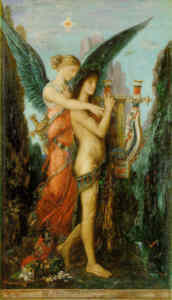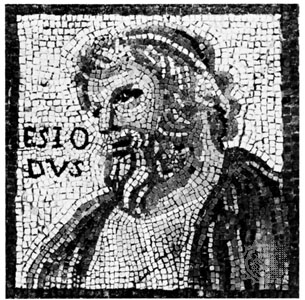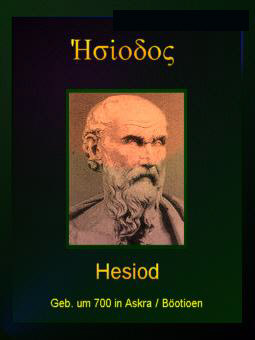Allgemein
 Hesiod Hesiod
Roula Papageorgiou-Haska - vhaskas@zenon.logos.cy.net
He is one of the oldest Greek poets born in Askra of Boeotia
in the 8th century. He wrote two great poems: "Works and
Days" and "Theogony". In "Works and
Days" he speaks about justice and hard work, which is the
only way to success, and he gives advice about agriculture,
commerce, navigation as well as about marriage, bringing-up
children and other moral and useful precepts. "Theogony"
is an Epic which consists of 1022 lines and his author treats
the birth and the history of the Greek gods as well as the
creation of the Universe.
According to
him Chaos was out there first, then Earth, Tartarus - in the
depth of Earth -, and last of all Eros (Love). Eros is the
natural power which caused the union of the identical parts of
matter resulting in the formation of several bodies, and by
keeping them united it kept the whole Universe in order. These
four elements are mentioned as self made elements and not as
coming from each other. By "chaos" Hesiod means the
dark which dominated everywhere (or water). From Chaos came
forth Erebus and Night and then night bare Aether and Day. And
Earth first gave birth to Uranos (Heaven), then Mountains and Pontus.
After laying with Uranos
she begat six sons: Oceanus,
Coeus, Hyperion, Crius, Iapetus, Cronus (they were called
Titans), and six daughters: Theia, Rhea, Themis, Mnemosyne,
Phoebe, Tethys (called Titanides). According to Hesiod, then,
Earth could be said to be the centre of the Universe and the
matter by which the other bodies were formed.
http://www.greece.org/poseidon/work/argonautika/cosmo4.html
Hesiod
 The Columbia Encyclopedia: Sixth Edition. 2000
The Columbia Encyclopedia: Sixth Edition. 2000
8th cent.? B.C., Greek poet. He is thought to have lived later
than Homer, but there is no absolute certainty about the dates
of his life. Hesiod portrays himself as a Boeotian farmer.
Little is known of his life, however, except for the few scant
references he makes to his family’s origin and to a quarrel
over property with his brother. His most famous poem, the
didactic Works and Days, is an epic of Greek rural
life, filled with caustic advice for his brother and maxims
for farmers to pursue.
Works and
Days
discourses on the mythic “five races” (i.e., the five ages)
of humans; the Golden Age, ruled by Kronos, a period of
serenity, peace, and eternal spring; the Silver Age, ruled by
Zeus, less happy, but with luxury prevailing; the Bronze Age,
a period of strife; the Heroic Age of the Trojan War; and the
Iron Age, the present, when justice and piety had vanished.
Also ascribed to him are the Theogony, a genealogy of
the gods, and the first 56 lines of The Shield of Heracles.
http://www.bartleby.com/65/he/Hesiod.html
Hesiod
Hesiod probably lived around 700 BC, shortly after Homer, in a
Boeotian village of Ascra -- one of the details of his life he
reveals in his works. He worked as a shepherd in the mountains,
as a youth, and then, as a small peasant on a hard land when
his father died.
While tending
his flock on Mt. Helicon, the Muses appeared to him in a mist.
This mystical experience impelled him to epic poetry. His
major works are Theogony, Works and Days, and Shield
of Herakles.
http://ancienthistory.about.com/homework/ancienthistory/library/bl/bl_hesiod_bio.htm
Hesiod
fl. c. 700 BC. Greek HESIODOS,
Latin HESIODUS one of the earliest
Greek poets, often called the "father of Greek didactic
poetry." Two of his complete epics have survived, the Theogony,
relating the myths of the gods, and the Works
and Days, describing peasant life.
http://www.britannica.com/seo/h/hesiod/
|




